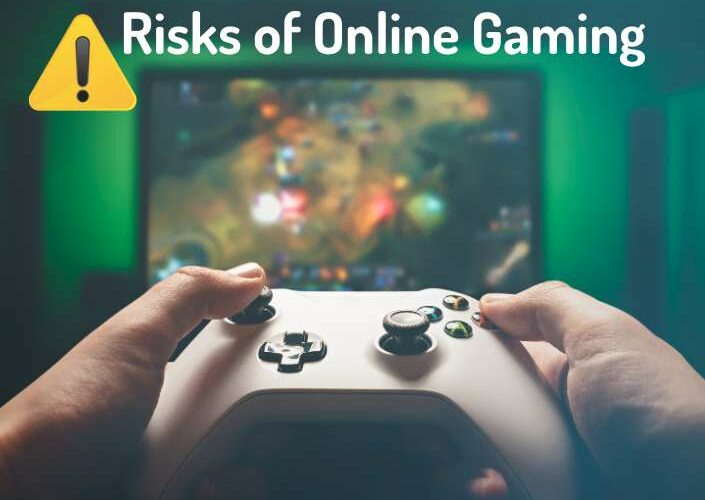The popularity of online gaming has skyrocketed in recent years, especially among children. With the advent of advanced technology and widespread internet access, kids now have easy access to a wide variety of online games. The allure of virtual worlds, multiplayer experiences, and competitive gameplay has captivated the younger generation, making online gaming a favorite pastime. However, along with its popularity, online gaming also brings various risks and challenges that parents and guardians need to be aware of.
The impact of online gaming on children
Online gaming has become increasingly popular among children in recent years, and its impact on them cannot be ignored. While there are certainly benefits to playing games online, such as improved problem-solving and cognitive skills, there are also risks that parents need to be aware of. One of the main concerns is the potential for addiction, as children can easily become obsessed with gaming and neglect other important aspects of their lives, such as schoolwork and social interactions. Additionally, online gaming exposes children to various forms of inappropriate content and online predators, which can have serious consequences for their safety and well-being. Therefore, it is crucial for parents to closely monitor their children’s online gaming activities and educate them about the potential risks involved.
The need to understand the risks
In today’s digital age, online gaming has become increasingly popular among children. While it can provide entertainment and educational benefits, it is crucial for parents and guardians to understand the potential risks associated with this activity. By being aware of these risks, they can take the necessary steps to ensure their children’s safety and well-being while engaging in online gaming. It is important to recognize that online gaming can expose children to inappropriate content, cyberbullying, online predators, and excessive screen time. Therefore, parents should actively monitor their child’s gaming activities, set appropriate time limits, and educate them about safe online practices. By doing so, parents can help their children enjoy the benefits of online gaming while minimizing the potential risks.
Types of online gaming
Massively multiplayer online games (MMOs)
Massively multiplayer online games (MMOs) have gained immense popularity among kids in recent years. These games allow players to connect and interact with thousands of other players from around the world, creating a virtual community. While MMOs offer a unique gaming experience and can be a source of entertainment and socialization, they also come with certain risks that parents need to be aware of. The online nature of these games exposes kids to potential dangers such as cyberbullying, inappropriate content, and online predators. It is crucial for parents to understand these risks and take necessary measures to ensure their children’s safety while playing MMOs.
Social media games
Social media games have become increasingly popular among kids in recent years. These games, which can be played on platforms such as Facebook and Instagram, offer a wide range of entertainment options and social interactions. However, it is important for parents to understand the potential risks associated with these games. Some social media games may expose kids to inappropriate content or encourage unhealthy competition and addictive behavior. It is crucial for parents to monitor their children’s online gaming activities and educate them about online safety measures. By doing so, parents can help ensure that their kids have a positive and safe gaming experience on social media platforms.
Mobile games
Mobile games have become increasingly popular among kids in recent years. With the rise of smartphones and tablets, children now have easy access to a wide variety of games that can be played anytime, anywhere. While mobile games can be entertaining and educational, they also come with certain risks. It is important for parents to understand these risks and take appropriate measures to ensure their child’s safety while playing online games on their mobile devices.
Potential risks of online gaming
Exposure to inappropriate content
Exposure to inappropriate content is one of the significant risks associated with online gaming for kids. With the vast amount of user-generated content and the lack of strict monitoring, children may come across violent, explicit, or age-inappropriate material while playing online games. This exposure can have a detrimental impact on their mental and emotional well-being, influencing their behavior and attitudes. Parents and guardians must be vigilant in supervising their children’s online gaming activities and implementing appropriate content filters to protect them from such harmful content.
Cyberbullying and online harassment
Cyberbullying and online harassment are serious concerns when it comes to the risks of online gaming for kids. With the anonymity provided by the internet, individuals can easily target and harass young players, causing emotional distress and psychological harm. Cyberbullying can take various forms, such as sending threatening messages, spreading rumors, or even creating fake profiles to deceive and manipulate others. It is crucial for parents and guardians to educate children about the dangers of cyberbullying and encourage open communication, so they can seek help if they experience any form of harassment while gaming online.
Addiction and excessive screen time
Online gaming addiction and excessive screen time are significant concerns for parents and caregivers. With the increasing availability and accessibility of online games, children are spending more time in front of screens, often neglecting other important activities such as schoolwork, physical exercise, and social interactions. This excessive screen time can lead to a variety of negative effects on their physical and mental health, including obesity, sleep disturbances, poor academic performance, and social isolation. It is crucial for parents to be aware of the risks associated with online gaming and to establish healthy boundaries and guidelines to ensure their children’s well-being.
Protecting children while gaming online
Setting parental controls
Setting parental controls is crucial when it comes to protecting children while they engage in online gaming. With the ever-increasing popularity of online gaming platforms, it is essential for parents to take proactive measures to ensure their children’s safety. By setting up parental controls, parents can restrict access to age-inappropriate content, limit screen time, and prevent interactions with strangers. These controls provide a sense of security and peace of mind, allowing parents to have better control over their children’s online gaming experiences.
Teaching responsible online behavior
Teaching responsible online behavior is crucial in ensuring the safety and well-being of children who engage in online gaming. With the increasing popularity of online gaming platforms, it is essential for parents and educators to educate children about the potential risks involved. By teaching them the importance of setting strong passwords, avoiding sharing personal information, and recognizing and reporting inappropriate content or behavior, we can empower children to navigate the online gaming world responsibly. Additionally, fostering open communication and establishing guidelines for online gaming can help create a safe and positive gaming experience for kids.
Monitoring gaming activities
Monitoring gaming activities is crucial for parents to ensure the safety and well-being of their children. With the increasing popularity of online gaming, it is important to be aware of the potential risks and take necessary precautions. By actively monitoring their children’s gaming activities, parents can identify any inappropriate content, excessive screen time, or interactions with strangers. This allows them to intervene and address any concerns promptly. Additionally, monitoring gaming activities can help parents foster healthy gaming habits, encourage responsible online behavior, and promote a balanced lifestyle. It provides an opportunity for open communication between parents and children, allowing them to discuss the potential dangers and develop strategies to stay safe while gaming. Ultimately, by monitoring gaming activities, parents can play an active role in protecting their children and ensuring a positive gaming experience.
Educating children about online gaming risks
Teaching the difference between real and virtual worlds
Teaching the difference between real and virtual worlds is crucial when it comes to online gaming for kids. With the increasing popularity of online gaming platforms, children are often exposed to virtual environments that blur the lines between reality and fantasy. As parents and educators, it is our responsibility to help children understand that the actions and consequences in the virtual world can have real-life implications. By teaching them the importance of distinguishing between the two worlds, we can empower them to make informed decisions, develop critical thinking skills, and navigate the online gaming landscape safely.
Discussing the importance of privacy and personal information
In today’s digital age, it is crucial to discuss the importance of privacy and personal information when it comes to online gaming for kids. With the increasing popularity of online gaming platforms, children are exposed to various risks that can compromise their privacy and personal information. It is essential for parents and guardians to educate their children about the potential dangers and teach them how to protect their personal data. By discussing the importance of privacy and personal information, we can empower kids to make informed decisions and develop responsible online gaming habits.
Encouraging open communication about online experiences
Encouraging open communication about online experiences is crucial when it comes to understanding the risks of online gaming for kids. By fostering an environment where children feel comfortable discussing their online experiences, parents and guardians can gain valuable insights into the potential dangers they may encounter. This open dialogue allows for the identification of any concerning behavior or inappropriate content, enabling parents to provide appropriate guidance and support. Moreover, open communication helps build trust between children and their caregivers, creating a foundation for ongoing discussions about online safety. By encouraging open communication, parents can empower their children to make informed decisions and navigate the online gaming world responsibly.
Conclusion
Balancing the benefits and risks of online gaming
Online gaming can offer numerous benefits for kids, such as improving problem-solving skills, fostering teamwork, and enhancing creativity. However, it is essential to balance these benefits with the potential risks involved. One of the main risks of online gaming is the exposure to inappropriate content and online predators. Parents should monitor their children’s online activities and set strict guidelines to ensure their safety. Additionally, excessive gaming can lead to addictive behavior and negatively impact academic performance. It is crucial for parents to encourage a healthy balance between online gaming and other activities. By being aware of the risks and taking necessary precautions, parents can ensure that their children can enjoy the benefits of online gaming while staying safe.
Empowering children to make informed decisions
Empowering children to make informed decisions is crucial when it comes to online gaming. With the increasing popularity of online gaming among kids, it is important for parents and guardians to educate them about the potential risks involved. By providing them with the necessary knowledge and guidance, children can learn to navigate the online gaming world safely and responsibly. This includes understanding the importance of privacy settings, recognizing and avoiding online predators, and managing their time spent gaming. Empowering children in this way not only helps protect them from potential dangers but also promotes their overall digital literacy and critical thinking skills.
The role of parents and educators in ensuring online safety
The role of parents and educators in ensuring online safety is crucial in the world of online gaming for kids. With the increasing popularity of online gaming platforms, children are exposed to various risks such as cyberbullying, inappropriate content, and online predators. Parents and educators need to be proactive in monitoring and guiding children’s online activities to minimize these risks. This can be achieved by setting clear rules and boundaries, educating children about online safety, and regularly communicating with them about their experiences and concerns. Additionally, parents and educators should stay informed about the latest trends and technologies in online gaming to better understand the potential risks and implement effective safety measures. By actively participating in their children’s online gaming experiences, parents and educators can create a safe and supportive environment that promotes responsible and enjoyable gaming for kids.




